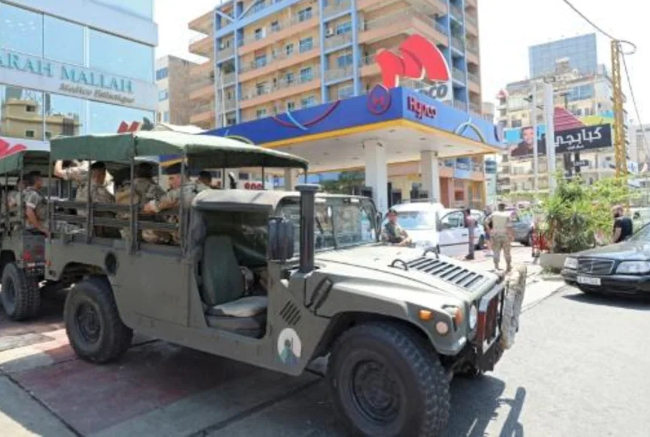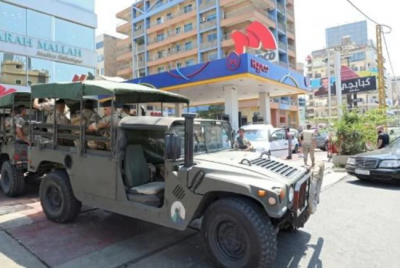The Lebanese army deployed to fuel stations on Saturday amid a severe fuel shortage, while the governor of the Central Bank of Lebanon maintained his refusal to reinstate subsidies for fuel imports despite the worsening crisis, which has prompted a major hospital to warn of an "imminent disaster."
Since Thursday, the Central Bank of Lebanon announced the commencement of fuel imports that were previously subsidized, according to the black market exchange rate exceeding 20,000 Lebanese pounds, while the official rate remains fixed at 1,507 pounds, effectively ending support for these vital materials. During an interview with local Radio "Lebanon Libre," Central Bank Governor Riad Salameh stated, "I will not back down on lifting fuel subsidies unless the use of mandatory reserves is legislated," referring to a percentage deposited by private banks with the central bank against their foreign currency deposits, which the law prohibits from being touched.
Previously exceeding $30 billion before the ongoing crisis that began in 2019, Salameh estimated that the remaining mandatory reserves are approximately $14 billion, in addition to $20 billion in foreign assets.
Since Wednesday, the Central Bank announced that it would begin paying for fuel purchase credits according to the black market exchange rate, which effectively means the authorities have lifted subsidies for these essential materials, leading to a sharp increase in their prices. Owing to the fuel crisis, and the lack of maintenance and infrastructure, the ability of the Electricité du Liban (Electricity of Lebanon) to provide electricity has steadily declined in recent months, resulting in power cuts exceeding 22 hours daily. Private generators can no longer secure the necessary diesel to cover the hours of electricity outages, forcing them to also impose rationing and significantly raise their rates due to purchasing diesel from the black market.
On Saturday, the American University of Beirut hospital warned of "an imminent disaster," indicating it would be forced to "close down by Monday morning due to fuel shortages." It confirmed in a statement that "forty adult patients and fifteen children on ventilators will die immediately. One hundred eighty patients suffering from renal failure will die from poisoning within days without dialysis. Hundreds of cancer patients, both adults and children, will die in the coming weeks and months without appropriate treatment."
Lebanon is experiencing a severe economic crisis described by the World Bank as among the worst in the world since 1850, and the rapid collapse has drained the Central Bank's dollar reserves as the Lebanese pound has lost more than 90% of its value. The country has been suffering from a fuel shortage for weeks, negatively impacting the capability of public institutions, private establishments, and even hospitals to provide their services.
The decision to lift fuel subsidies has sparked public outrage, with some Lebanese blocking roads in protest, asserting that this decision could raise prices by more than 300%. Salameh responded to political criticisms regarding the subsidy lift, confirming that "all stakeholders were aware of the decision," and urged them instead to legislate a law that "finances imports from the mandatory reserves."
**Army Intervention**
Reports indicated very long queues forming at fuel stations, with angry citizens obstructing fuel tankers in some areas, according to local media outlets. The army announced it has started "raiding fuel stations and seizing stored quantities of gasoline."
It reported the confiscation of 25,500 liters of gasoline stored at a station in Bourj and 53,000 liters from a station in Deir el-Qamar, as well as the distribution of 57,000 liters of seized diesel from a station in Lala - West Bekaa to generators and agricultural projects at the official price. The army shared photos on social media showing soldiers personally distributing gasoline to cars at fuel stations.
The army confirmed in a statement that its units "will seize all quantities of gasoline found stored at these stations, which will then be distributed directly to the public free of charge." Similarly, the Internal Security Forces declared that they "will not stand idly by in the face of what citizens are enduring," affirming that "some fuel stations are hoarding supplies and withholding them from consumers for various reasons."
It pledged to deploy patrols to monitor station stocks, warning that "if it is confirmed that stations have sufficient stock that can be distributed... we will proceed with the distribution in a manner we see fit." Salameh criticized fuel importers and distributors, with officials linking the current crisis to two key factors: the initiative of traders and station owners to hoard fuel in anticipation of a price increase and a rise in smuggling to neighboring Syria.
Salameh said, "It is unacceptable to import $820 million worth of fuel and see no diesel nor gasoline nor electricity." He emphasized that "the traders are responsible for the irrational distribution of goods," adding that "we expected to use the $820 million for three months, not just one month."
Political entities have sharply criticized the monetary policies adopted by Salameh, who has been in office since 1993, claiming that they have accumulated debt. However, Salameh has repeatedly defended himself, stating that the central bank "financed the state but did not spend the money."
In April, the Lebanese judiciary opened a local investigation into Salameh's wealth and its sources after he was targeted by an investigation in Switzerland over suspected embezzlement, before also being targeted by an investigation in France and a complaint in the UK.




